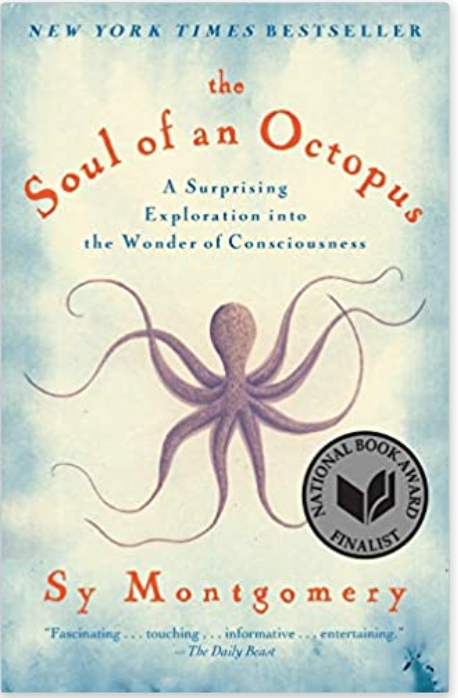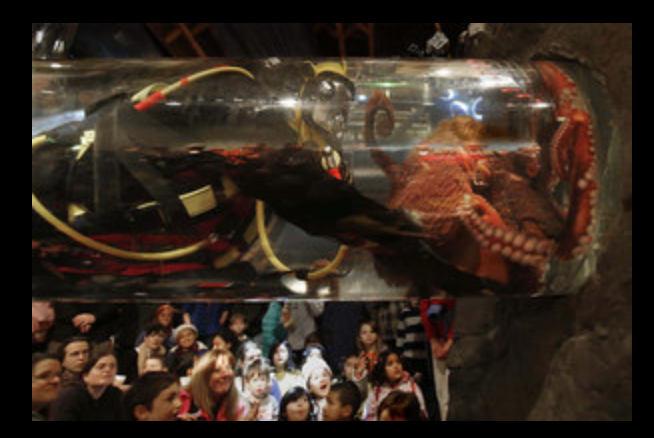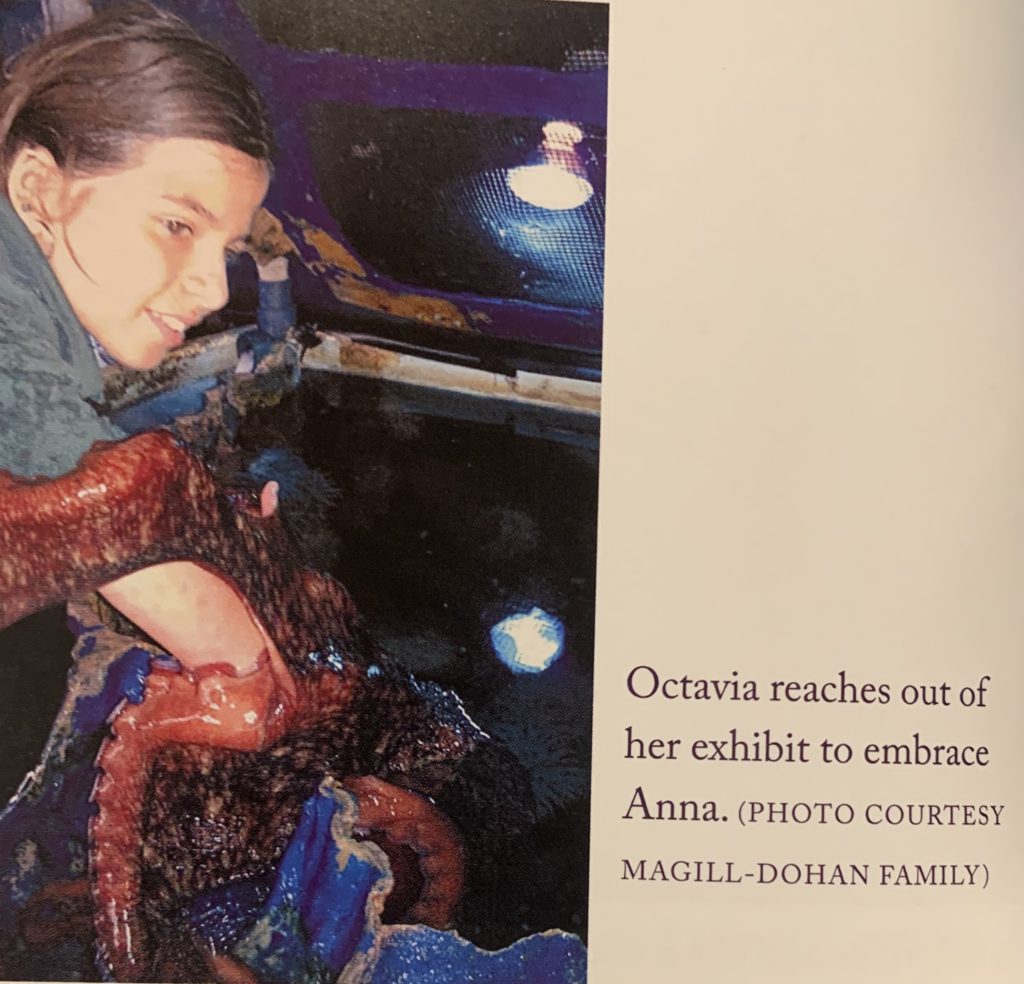In the meeting of wills between Octopus and Human, there is, however bizarrely, a common ground. And for some, unique relationships and an unconventional form of therapeutic healing, in the bittersweet joy of falling in love with someone of such disproportionately short lifespan, for one of its sentience.
“Fish stress” is the odor of “heat-shock” intercellular proteins released by plants and animals initially associated with heat, but more recently other stresses as well. Stressy octopuses and jellyfish smell like geraniums, anemones smell salty-sour. The title line is spoken by senior freshwater aquarist Scott Dowd who gets worried detecting it around the cichlids who have just changed tanks. People who spend their working lives in aquariums can detect such smells, writes author Sy Montgomery in her New York Times Bestseller, the Soul of an Octopus, just as many of us unconsciously react to the angle of a horse’s ears, height of a dog’s tail, expression in a cat’s eyes.

Cover your eyes for just several days, and your sight neurons will already be repurposing themselves, becoming devoted to your sense of touch, writes neuro-scientist Lisa Feldman Barrett in 7 ½ Lessons About the Brain. On one hand, this is a powerful illustration how far even simple stimulations can take our brains. Any neuron can do more than one thing. It is a brain’s special ability to configure itself into an enormous number of distinct neural patterns, says Barrett. (On the other hand, how many extra neurons are we employing for mindless cellphone screen scrolling nowadays, that might otherwise be deployed for other functions. There is enough yet unknown, enough potential, to provide for “miracle” stories (also science fiction featuring Scarlett Johannson and Bradley Cooper – quick digression.))

ScarJo is very, very convincing playing Lucy, the college girl abroad who dates the wrong guy in the early scenes (I showed the kids bits of it for an unrelated reason – Lucy knows she’s with the wrong guy, she keeps attempting to walk away, only to be manipulatively delayed j-ust a little while longer…. right until he handcuffs her to a briefcase in front of what turns out to be an HQ of the South Korean kkangpae, forcing her to deliver it in order to get it off her wrist. Her regret and terror at ending up in the situation from not getting away from the guy fast enough is a very powerful lesson expertly played by ScarJo, to Not Hesitate – WALK AWAY NOW!! (Also, Choi Min-Sik is super scary as the kkangpae boss.)
Already incriminated, she is forced to be a drug mule, then gets punched in the stomach fending off a thug’s advances, resulting in the sausage-like bags of the experimental smart drug she was carrying in her stomach splitting open, releasing lethal doses into her system. She becomes supersmart for a couple days, taking out the kkangpae, after which “Lucy” as we know her dies, her brain evolving into some kind of super computer.
Bradley Cooper’s Limitless portrays the increasingly disturbing side effects of smart drug use, but the happy ending is, being smart (:D), he eventually realises the first thing he should have done is figure out how to succeed without drugs. He ends up living his best successful life without needing to take anything 
Image from Why Limitless and Lucy are Medically Unsound article, and this is a quick clip that rushes through the 2 movies’ similarities.
A-nd now we’ve established No Free Lunch holds true in the matter of “smart drugs”, let’s go back to octopuses
How do you explain colour to a blind person? Ask the octopus.
While octopuses have 30-50 different patterns/colours at their disposal and can change colour, pattern and texture in 7/10s of a second, they are essentially colour blind, equipped with just the cones (cells that catch light and differentiate colour) that see black and white. But wait – like I used to say with new-fangled investment products, where’s the catch?

There is an old (popular) Tumblr account titled WTF Evolution by published science writer Mara Grunbaum with the tagline Go Home Evolution, You Are Drunk because of all the weird, whacky real animals that exist right here (not jumping on the Bash Bezos Bandwagon, but Aliens In Space: 0. Aliens On Earth: We Still Can’t Count Exactly How Many). Sure lots of these “aliens” are good to eat (sorry), but I strongly believe that is really not the only reason they’re on this planet. While we identify various animals carrying strains of diseases, I believe everything has a “good” and a “bad”, (that humans exploit or envy because of our flawed or limited ways of looking at things). Within living things lies the key to so many ideas we could employ that could make our world better.
I think a wider knowledge of how living things have developed efficient systems – dare I coin “Intelligent Design” (Grunbaum quips “Unintelligible Design”) – would greatly enrich the way we designed and built all manner of technology and artificial intelligence as well.
A human brain has 4 lobes. An octopus brain has 50-75 lobes. Octopuses have mouths in their armpits, more brain cells in their arms than in their heads, which also have their esophagus running right through it. Their arms may have different personalities. Research shows they may have “shy” arms, and “bold” arms). It was also found (by the Binyimin Hochner laboratory, according to the book Other Minds) that they took a lot longer to find food if the arm had to also rely on the brain/ eyes attached to it, in a special maze where the arm had to leave the water conduit and the animal had to navigate the final portion of the see-through maze the way a human uses his/her arms.

Some aquariums keep guide books handy for volunteers and staff to ensure the octopuses are kept entertained and stimulated. Mr Potato Head is a favourite for “Octopus Enrichment”. “Octopus Psychologist” is an actual vocation.
Prof. Jennifer Mather (I feel making the obvious “Real Dr Octopus” quip would not do her justice) taught Child Development Perception, Lifespan Development of Women, and Psychology of Aging (in humans) at the University of Lethbridge, before studying cephalopods in waters ranging from Moorea to Okinawa. Aged around 69 at the time of Montgomery’s Soul of the Octopus release in 2015, Mather’s work went from overlooked/ dismissed at a time when people neither believed animals had personalities nor that women could be capable field scientists, to widely respected and cited by neuroscientists, neuropharmacologists, neuroanatomists, and the Cambridge Declaration on Consciousness which counts late great Stephen Hawking as a signatory.
“Over the past decades, we as researchers have struggled… Ethical consideration of animals has followed our general human-centered principle: the more they look like us, the more likely we are to consider their welfare…” – Prof Mather in Octopus, a Natural History.
Because cephalopods were not covered by animal cruelty laws in the past, the ways in which experiments used to be conducted on them could be quite disturbing.
Today, it’s official that electric eels dream (and shock things in their sleep), even lobsters have different personalities, turtles develop crushes (not necessarily on other turtles, leading to possessive nipping of fish competitors) and octopuses….. really get into all kinds of trouble. If you want a battle of wits with an alien intelligence, octopuses are a good (mental) trip…
“Did you ASK me first?”
Pre-vet students describe their study to measure cephalopod IQ by having small octopuses navigate mazes morphing into a seeming One Flew Over The Cuckoo’s Nest-like conspiracy among test subjects to not cooperate. Instead of Mental Patients vs Nurses, it was Octopuses vs Students. The animals in the study made it extra difficult for researchers – they hid, stuck fast to the sides of tanks making it close to impossible to forcibly detach them (octopus suckers are unexpectedly strong, which is why aquariums caution against allowing tentacles on faces/eyes), or else feigned compliance… only to springboard themselves off capture nets and scurry off along the floor of the lab.
One choice subject chose the moment her student researcher was dressed in a nice suit and had just started the cameras rolling to film her thesis presentation, to hose her with tank water from top to toe. (Many different accounts of octopus encounters illustrate they use their jets to play with toys or mess with humans. These include destroying parts of experiments they don’t like – which is what one animal did when they tried to train him to pull a lever for food. Yes, he recognised the lever. No, he was not going to pull it. Every time he saw the lever coming, he hosed the researcher. Finally, he took apart the lever so they would stop bringing it.)

Back in 2000, the Seattle Aquarium placed an octopus in a huge tank with several 4-5 foot sharks. The average octopus in the wild is a solitary creature that spends 70-90% of its time hiding. Concerned for the welfare of the boneless, shell-less cephalopod, the aquarium provided ample hiding places for it, hoping it wouldn’t get too stressed by the large predators swooping about above it.
CCTV footage however revealed they should have worried about the sharks, not the octopus. They were right that the octopus did not like having sharks in its neighbourhood. However no one could have predicted that left with no further means of distancing itself from the potential predators, this particular octopus (for they vary greatly in personality), decided to systematically take out the sharks one by one. Before any sharks ever attacked the octopus, aquarium staff regularly found a dead shark at the bottom of the tank. (Sharks have to keep moving to breathe; if you immobilise them with tentacles, they drown.)
Remarks about the animal’s thinking processes include that we barely understand them enough to even test them. Yet the true accounts in Montgomery’s Soul illustrate how in the meeting of wills between Octopus and Human, there is, however bizarrely, a common ground. (Which is the other big reason I started inhaling octopus books.)
For some people in Sy Montgomery’s Soul of an Octopus account, unique relationships and an unconventional form of therapeutic healing are formed, in the bittersweet joy of falling in love with someone of such disproportionately short lifespan, for one of its sentience:
The New England Aquarium, the backdrop for the majority of Montgomery’s encounters, has a volunteer program that at time of telling coordinated some 662 adult and 100 teen volunteers pre-covid, contributing an estimated USD 2million worth of time and energy. Among the volunteers are Iran-born Wilson who attended boarding school in the UK followed by Colombia University in New York, where he studied chemical engineering. Now in his late 70s and a grandfather of nearly grown grandchildren, he divides his time between the aquarium (building octopus enrichment toys), hospice visits to his Russian/Polish/American wife, and recuperation from major back surgery.
“It’s not easy having a twin that’s like this…” Christa is 25, has an upper lip piercing, an advanced Biology degree, a part time job 4-5 nights in a bar, and is working to gain legal custody of her special needs brother (their parents provide a loving and safe home, but Christa describes feeling angry and upset her twin hadn’t been able to join her at college and has wanted to keep him with her since.)
Danny has pervasive developmental disorder, with at times disabling delay in acquiring basic skills, but he starts every morning just the happiest person. Christa’s 10 year plan is to score a 2-bedroom for them both near the aquarium, full-time employment there, and hopefully also a job for Danny in the gift shop someday. By the end of that summer she has secured the one full-time job that came up, beating 50 other hopefuls, in the aquarium’s education department.
“Going behind the scenes at the aquarium changed my life… The people here are as different from regular people as an octopus.” 16 year old Anna, enrolled in “special school” as she calls it, feels misunderstood, has an athletic male twin very unlike herself. Also Aspergers, ADD, migraines and a tremor that gets much worse when she is under stress, and requires various constant medications (she’s been bitten by an octopus when she changed medications much to the alarm of the aquarium and their medics’ careful attention – bites are very rare, and if an octopus, even a less venomous species, chooses to envenomate its bite and the human is allergic, it can be potentially life threatening. Anna’s bite was not envenomated (and a small scratch but they take even those very seriously because it’s coming from an octopus not a hamster), and her biggest concern was not being allowed near the octopuses after being bitten. She was still allowed, and not bitten again).
Anna initially enrolled in summer “fish camp” around 6th grade. Her eagerness at camp had led to an invitation to see one of the labs, by an aquarium department head who used to teach high school. Unable to read an analog watch at the time and anxious she would miss the appointment, she had waited outside the door for the entire hour until the staff returned to show her around.

“I cried, but then I stopped.. because there was an octopus on me..…”
When an octopus touches you or even if you simply touch their water, their skin can taste the chemicals in your tears, differentiating between “emotional” tears (sadness or joy produces certain chemicals), the change in your body chemistry when you feel pain or switch medications…. And in Soul they appear repelled by the taste of pack-a-day-smokers, which Montgomery speculates is because nicotine is toxic to many animals.
When her best friend Shaira ended her life, Anna had tried to as well. Volunteering at the aquarium Anna, who had occasionally sought escape into drugs after losing Shaira, couldn’t imagine “using” around the animals. Tending her beloved friend’s grave site as well as curious young octopuses, she described the time “the worst summer of my life… but my days at the aquarium ..were the best.”
“I’ve learned that happiness and sadness are not mutually exclusive.” She has also learned the Latin names of every marine vertebrate and invertebrate at the aquarium.


One thing I’ve noticed is the fact that there are plenty of beliefs regarding the financial institutions intentions if talking about foreclosure. One fairy tale in particular is the fact the bank would like your house. Your banker wants your dollars, not the house. They want the money they loaned you along with interest. Staying away from the bank will undoubtedly draw any foreclosed realization. Thanks for your post.
Hi there! This is my first visit to your blog! We are a collection of volunteers and starting a new project in a community in the same niche. Your blog provided us useful information to work on. You have done a marvellous job!
One other issue issue is that video games are generally serious as the name indicated with the principal focus on mastering rather than enjoyment. Although, it comes with an entertainment feature to keep the kids engaged, just about every game is often designed to work with a specific skill set or programs, such as numbers or research. Thanks for your article.
You completed a few nice points there. I did a search on the topic and found most persons will consent with your blog.
hello there and thank you for your information ?I抳e definitely picked up anything new from right here. I did however expertise a few technical points using this website, since I experienced to reload the web site many times previous to I could get it to load properly. I had been wondering if your hosting is OK? Not that I’m complaining, but slow loading instances times will often affect your placement in google and can damage your high quality score if advertising and marketing with Adwords. Well I抦 adding this RSS to my email and can look out for much more of your respective intriguing content. Ensure that you update this again very soon..
magnificent post, very informative. I wonder why the other experts of this sector don’t notice this. You should continue your writing. I am sure, you have a huge readers’ base already!
Thanks for sharing superb informations. Your web-site is very cool. I am impressed by the details that you have on this site. It reveals how nicely you understand this subject. Bookmarked this web page, will come back for extra articles. You, my pal, ROCK! I found just the info I already searched everywhere and just couldn’t come across. What an ideal site.
Pretty section of content. I just stumbled upon your web site and in accession capital to assert that I acquire actually enjoyed account your blog posts. Anyway I will be subscribing to your feeds and even I achievement you access consistently rapidly.
Hello there, just turned into alert to your blog through Google, and found that it is really informative. I am going to watch out for brussels. I will appreciate when you continue this in future. A lot of other people will probably be benefited from your writing. Cheers!
Very nice post. I just stumbled upon your weblog and wished to say that I have really enjoyed surfing around your blog posts. In any case I抣l be subscribing to your rss feed and I hope you write again very soon!
I and my buddies appeared to be taking note of the great key points on your website and before long I got an awful suspicion I had not expressed respect to you for them. The women were consequently joyful to read through them and have in effect in fact been enjoying them. I appreciate you for indeed being really accommodating and also for obtaining some terrific themes most people are really wanting to be informed on. My very own honest apologies for not expressing appreciation to you earlier.
I’ve observed that in the world nowadays, video games will be the latest phenomenon with kids of all ages. There are times when it may be out of the question to drag your son or daughter away from the video games. If you want the best of both worlds, there are plenty of educational video games for kids. Good post.
I have been browsing online more than three hours today, yet I never found any interesting article like yours. It抯 pretty worth enough for me. In my opinion, if all website owners and bloggers made good content as you did, the web will be a lot more useful than ever before.
It’s best to take part in a contest for the most effective blogs on the web. I’ll recommend this site!
Right here is the perfect webpage for everyone who would like to understand this topic. You understand a whole lot its almost tough to argue with you (not that I really will need toÖHaHa). You certainly put a fresh spin on a subject that has been discussed for a long time. Wonderful stuff, just excellent!